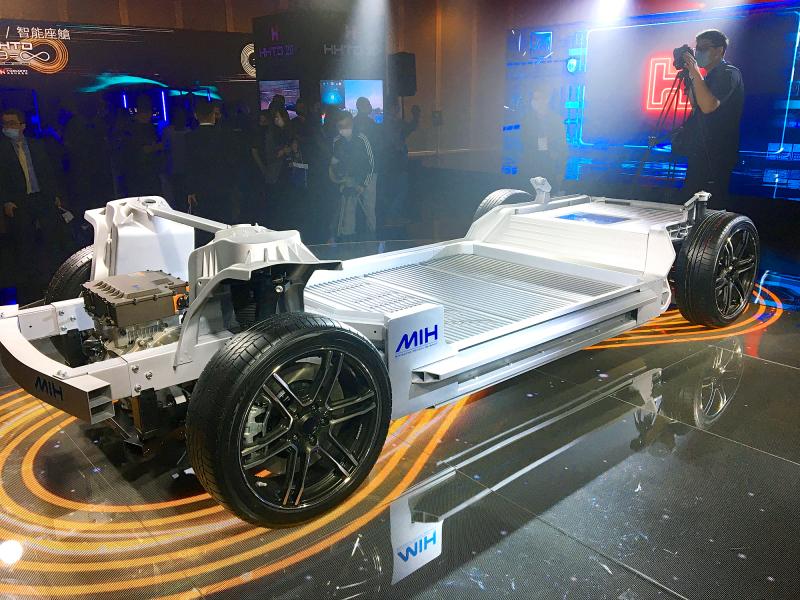Hon Hai Precision Industry Co’s (鴻海精密) electric vehicle (EV) project with Byton Ltd (拜騰) has been put on hold due to the Chinese start-up’s worsening financial situation, the Nikkei Asia reported yesterday, citing unidentified sources with knowledge of the matter.
“The project is not officially terminated yet, but it is very challenging to proceed at this moment,” one of the sources told the newspaper.
Hon Hai in January said that the Apple assembler and China’s Nanjing Economic and Technological Development Zone had agreed to next year start building electric sport-utility vehicles for Byton.

Photo: CNA
A few Hon Hai employees are still stationed at Byton’s factory, but “they are wrapping things up and preparing for the end when it becomes necessary,” another source said.
Some higher-level personnel involved in the project has even left Hon Hai, the report added.
However, the firm’s plans to build factories in the US and Thailand to assemble entire vehicles in 2023 are intact, the report said.
Hon Hai declined to comment, while Byton did not immediately respond to a request for comment.
Meanwhile, the firm has agreed to team up with Thailand’s state-owned oil supplier PTT Public Co to invest up to US$2 billion in launching an EV joint venture in Thailand.
Hon Hai signed an agreement with PTT on Tuesday to open an EV production site, with the two partners setting their sights on the ASEAN market, it said.
Through the joint venture, PTT would use its subsidiary Arun Plus Co to consolidate the group’s energy development resources and help the two partners build an EV development chain in Thailand, Hon Hai said.
EV designers, component producers, assemblers, power system providers and battery suppliers in Thailand are welcome to join the development chain to roll out their products, Hon Hai added.
At the end of May, Hon Hai announced that it had signed a memorandum of understanding with PTT to enter the EV market in Thailand.
The agreement signed on Tuesday included financial terms for the joint venture.
After signing Tuesday’s accord, Hon Hai said that the investment plan would be carried out over five to six years by setting up production lines, a supply chain management center and an engineering research and development center.
Hon Hai said that the EV joint venture’s production site might be built in the Eastern Economic Corridor special development zone in Thailand.
The development zone is an initiative the Thai government has laid out as part of a 20-year strategy for the country to achieve high-income status by 2036.
In the initial two to three years of the agreement with PTT, the joint venture aims to produce 50,000 EVs a year, with production expected to expand to 150,000 units annually, Hon Hai said.
The government targets 30 percent of all vehicle production to be zero-emission vehicles by 2030, in an effort to produce 725,000 emission-free passenger vehicles by that year.
Hon Hai said that it is planning to take advantage of the government’s ambition to provide the domestic market with innovations and resources in EV development and thereby help Thai auto and auto part makers transform themselves into EV developers.
Commenting on the joint venture with PTT, Hon Hai chairman Young Liu (劉揚偉) said that he expects that the EV market in the ASEAN bloc would grow rapidly and cooperation with PTT would create tremendous business opportunities for many Thai vehicle developers.
Additional reporting by CNA

In Italy’s storied gold-making hubs, jewelers are reworking their designs to trim gold content as they race to blunt the effect of record prices and appeal to shoppers watching their budgets. Gold prices hit a record high on Thursday, surging near US$5,600 an ounce, more than double a year ago as geopolitical concerns and jitters over trade pushed investors toward the safe-haven asset. The rally is putting undue pressure on small artisans as they face mounting demands from customers, including international brands, to produce cheaper items, from signature pieces to wedding rings, according to interviews with four independent jewelers in Italy’s main

Macronix International Co (旺宏), the world’s biggest NOR flash memory supplier, yesterday said it would spend NT$22 billion (US$699.1 million) on capacity expansion this year to increase its production of mid-to-low-density memory chips as the world’s major memorychip suppliers are phasing out the market. The company said its planned capital expenditures are about 11 times higher than the NT$1.8 billion it spent on new facilities and equipment last year. A majority of this year’s outlay would be allocated to step up capacity of multi-level cell (MLC) NAND flash memory chips, which are used in embedded multimedia cards (eMMC), a managed

Japanese Prime Minister Sanae Takaichi has talked up the benefits of a weaker yen in a campaign speech, adopting a tone at odds with her finance ministry, which has refused to rule out any options to counter excessive foreign exchange volatility. Takaichi later softened her stance, saying she did not have a preference for the yen’s direction. “People say the weak yen is bad right now, but for export industries, it’s a major opportunity,” Takaichi said on Saturday at a rally for Liberal Democratic Party candidate Daishiro Yamagiwa in Kanagawa Prefecture ahead of a snap election on Sunday. “Whether it’s selling food or

In the wake of strong global demand for AI applications, Taiwan’s export-oriented economy accelerated with the composite index of economic indicators flashing the first “red” light in December for one year, indicating the economy is in booming mode, the National Development Council (NDC) said yesterday. Moreover, the index of leading indicators, which gauges the potential state of the economy over the next six months, also moved higher in December amid growing optimism over the outlook, the NDC said. In December, the index of economic indicators rose one point from a month earlier to 38, at the lower end of the “red” light.